牛津译林版 高三上册模块10 unit 4 law and orde Grammar and composition 一轮复习课件(共17张PPT)
文档属性
| 名称 | 牛津译林版 高三上册模块10 unit 4 law and orde Grammar and composition 一轮复习课件(共17张PPT) |

|
|
| 格式 | pptx | ||
| 文件大小 | 2.3MB | ||
| 资源类型 | 教案 | ||
| 版本资源 | 牛津译林版 | ||
| 科目 | 英语 | ||
| 更新时间 | 2024-01-24 12:19:57 | ||
图片预览


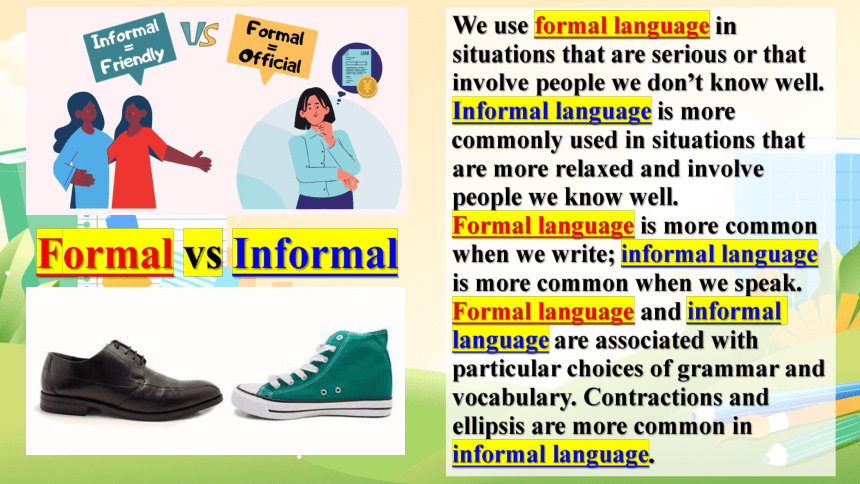
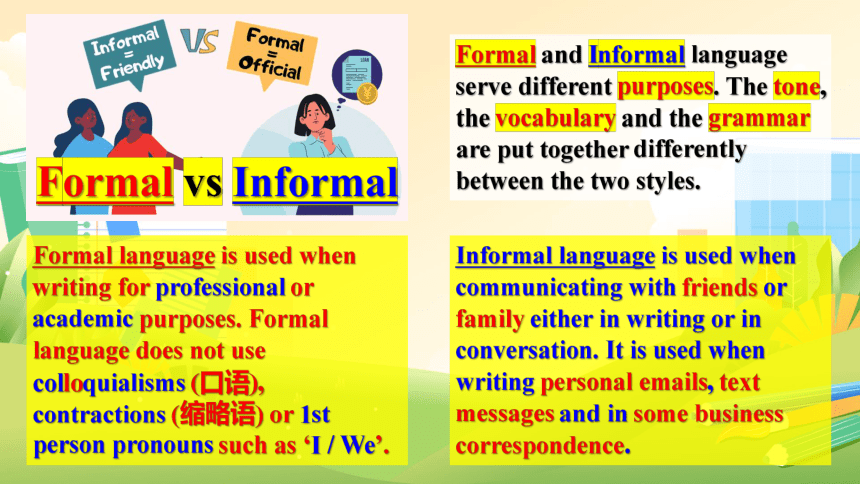
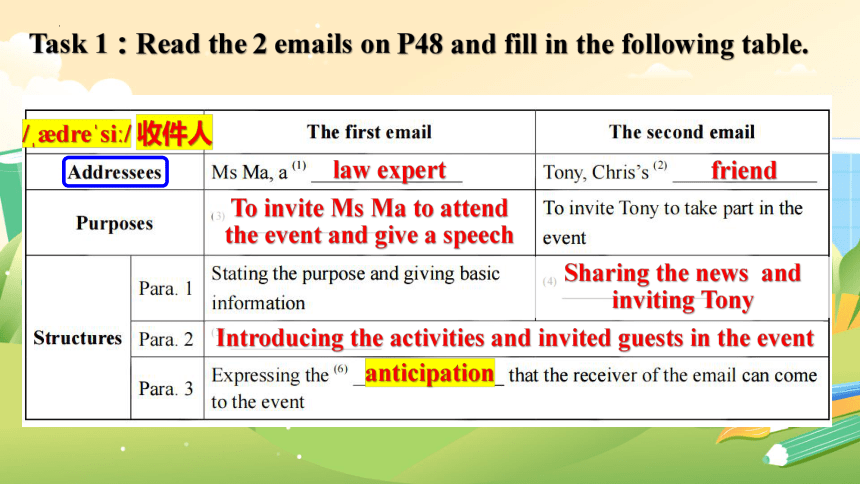
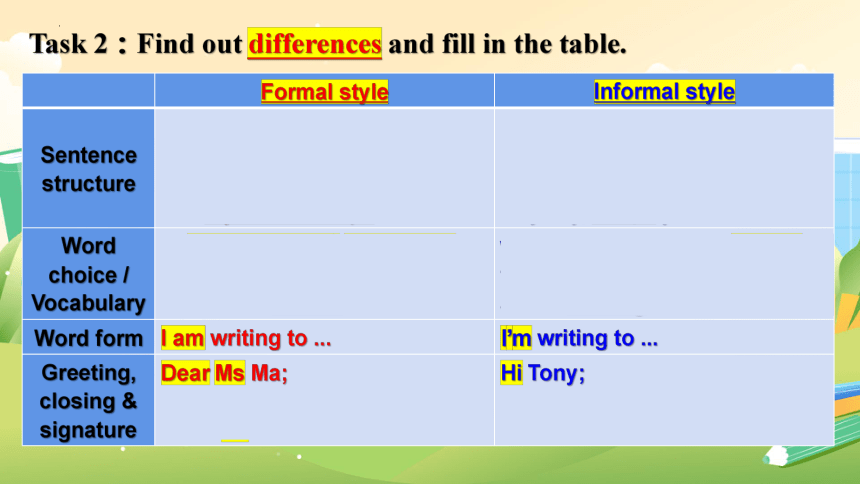
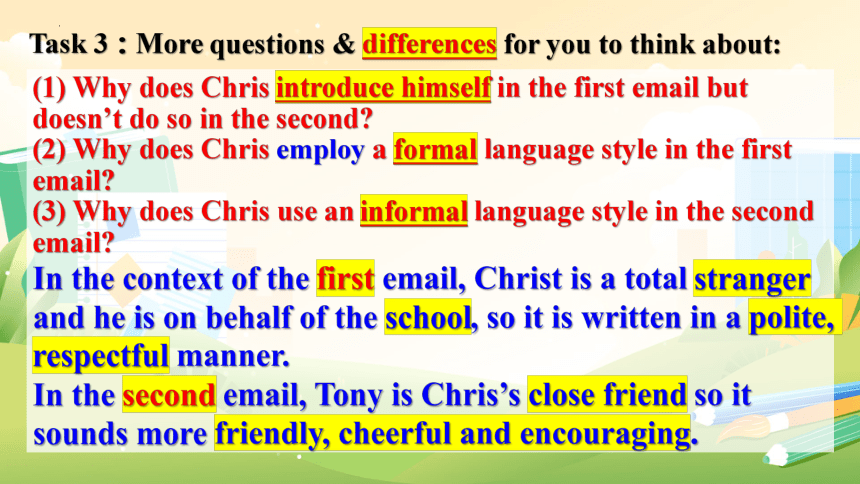
文档简介
(共17张PPT)
B9U4 Grammar & Composition
Language styles
语言文体
We use formal language in situations that are serious or that involve people we don’t know well.
Informal language is more commonly used in situations that are more relaxed and involve people we know well.
Formal language is more common when we write; informal language is more common when we speak.
Formal language and informal language are associated with particular choices of grammar and vocabulary. Contractions and ellipsis are more common in informal language.
Formal vs Informal
Formal and Informal language serve different purposes. The tone, the vocabulary and the grammar are put together differently between the two styles.
Formal language is used when writing for professional or academic purposes. Formal language does not use colloquialisms (口语), contractions (缩略语) or 1st person pronouns such as ‘I / We’.
Informal language is used when communicating with friends or family either in writing or in conversation. It is used when writing personal emails, text messages and in some business correspondence.
Formal vs Informal
Task 1:Read the 2 emails on P48 and fill in the following table.
law expert
friend
To invite Ms Ma to attend the event and give a speech
anticipation
Sharing the news and inviting Tony
Introducing the activities and invited guests in the event
/ dre si / 收件人
Task 2:Find out differences and fill in the table.
Formal style Informal style
Sentence structure I am writing to ask whether ... ... have been invited. It would be wonderful if you ... It is my sincere hope that ... I’m writing to let you know ...
I’ve invited her to give a speech.
Fingers crossed she’ll say yes!
Anyway, I hope you can make it!
Word choice / Vocabulary to raise students’ awareness; will include speeches; have been invited will probably be really helpful;
there’ll be a number of talks;
are all coming
Word form I am writing to ... I’m writing to ...
Greeting, closing & signature Dear Ms Ma; Kind regards; Chris Yu Hi Tony;
See you soon;
Chris
Task 3:More questions & differences for you to think about:
(1) Why does Chris introduce himself in the first email but doesn’t do so in the second
(2) Why does Chris employ a formal language style in the first email
(3) Why does Chris use an informal language style in the second email
In the context of the first email, Christ is a total stranger and he is on behalf of the school, so it is written in a polite, respectful manner.
In the second email, Tony is Chris’s close friend so it sounds more friendly, cheerful and encouraging.
Task 4:Work out the rules.
passive
abstract
active
↓
colloquial
/k l kwi l/
口语的,会话的
Task 5:Apply the rules. Decide styles & rewrite sentences on B1:
Formal
Informal
Formal
Informal
Informal
Formal
1. The Law Day fascinates me.
2. We’ll surely organize the Law Day every year.
3. We’ll hold the Law Day on 12 June.
4. It is delightful that Alice Ma is expected to attend the Law Day.
5. It is said that the speakers are all supposed to be experts.
6. We’ve written an email to Alice Ma, and we hope she replies soon.
Task 5:Apply the rules.
1. The Law Day fascinates me.
2. We’ll surely organize the Law Day every year.
3. We’ll hold the Law Day on 12 June.
4. It is delightful that Alice Ma is expected to attend the Law Day.
5. It is said that the speakers are all supposed to be experts.
6. We’ve written an email to Alice Ma, and we hope she replies soon.
Task 5:Apply the rules. Rewrite the sentences on B2.
1. Law experts and police officers came.
Law experts and police officers participated.
2. The guest speakers and their activities were a big hit!
The guest speakers and their activities were a huge success!
3. Representatives from the police held workshops and role-plays of some legal cases. They were involved in investigating these cases.
Representatives from the police held workshops and role-plays of some legal cases, which they were involved in investigating.
4. How eager students were to take part in a variety of activities! We were pleased to see that.
We were pleased to see how eager students were to take part in a variety of activities.
Task 6:Read the article in B2 again and fill in the following table.
Introduction
Highlights
Feedback / Comments
Task 7:Do the exercise.
Give my regards to your parents.
Have you seen my glasses
This project was a success.
It is believed that the practice is unsustainable. /
It is our belief that the practice is unsustainable.
Task 7:Do the exercise.
Should you require any assistance, please feel free to contact us.
Details about the survey can be found on page 11.
The software is extremely easy to use.
We regret to inform you that the delivery will be delayed due to unfavourable weather conditions.
Task 8:New words & expressions.
the Student Union Chairperson
aim to raise one’s awareness
role-player / Q&A sessions
a high-profile practising lawyer
in due course
Fingers crossed (that) ...
abstract / concrete
colloquial / contraction
There’s a definite possiblity that
学生会主席
旨在提高...意识
角色扮演/问答环节
备受瞩目的执业律师
在适当的时候
但愿……
抽象/具体
口语/缩写
很有可能
Task 8:New words & expressions.
be scheduled for
be over the moon
respective / a big hit
reach the top of one’s profession
look into / pursue law as a career
inform sb about sth
numerous / representatives
hold workshops and role-plays
be fired up about ...
被安排在
欣喜若狂
各自的/大获成功
达到自己职业的顶峰
调查/从事法律工作
通知某人某事
众多/代表们 (noun)
举办研讨会和角色扮演
对…充满热情/深受鼓舞
Task 9:Enjoy the video & learn something new.
B9U4 Grammar & Composition
Language styles
语言文体
We use formal language in situations that are serious or that involve people we don’t know well.
Informal language is more commonly used in situations that are more relaxed and involve people we know well.
Formal language is more common when we write; informal language is more common when we speak.
Formal language and informal language are associated with particular choices of grammar and vocabulary. Contractions and ellipsis are more common in informal language.
Formal vs Informal
Formal and Informal language serve different purposes. The tone, the vocabulary and the grammar are put together differently between the two styles.
Formal language is used when writing for professional or academic purposes. Formal language does not use colloquialisms (口语), contractions (缩略语) or 1st person pronouns such as ‘I / We’.
Informal language is used when communicating with friends or family either in writing or in conversation. It is used when writing personal emails, text messages and in some business correspondence.
Formal vs Informal
Task 1:Read the 2 emails on P48 and fill in the following table.
law expert
friend
To invite Ms Ma to attend the event and give a speech
anticipation
Sharing the news and inviting Tony
Introducing the activities and invited guests in the event
/ dre si / 收件人
Task 2:Find out differences and fill in the table.
Formal style Informal style
Sentence structure I am writing to ask whether ... ... have been invited. It would be wonderful if you ... It is my sincere hope that ... I’m writing to let you know ...
I’ve invited her to give a speech.
Fingers crossed she’ll say yes!
Anyway, I hope you can make it!
Word choice / Vocabulary to raise students’ awareness; will include speeches; have been invited will probably be really helpful;
there’ll be a number of talks;
are all coming
Word form I am writing to ... I’m writing to ...
Greeting, closing & signature Dear Ms Ma; Kind regards; Chris Yu Hi Tony;
See you soon;
Chris
Task 3:More questions & differences for you to think about:
(1) Why does Chris introduce himself in the first email but doesn’t do so in the second
(2) Why does Chris employ a formal language style in the first email
(3) Why does Chris use an informal language style in the second email
In the context of the first email, Christ is a total stranger and he is on behalf of the school, so it is written in a polite, respectful manner.
In the second email, Tony is Chris’s close friend so it sounds more friendly, cheerful and encouraging.
Task 4:Work out the rules.
passive
abstract
active
↓
colloquial
/k l kwi l/
口语的,会话的
Task 5:Apply the rules. Decide styles & rewrite sentences on B1:
Formal
Informal
Formal
Informal
Informal
Formal
1. The Law Day fascinates me.
2. We’ll surely organize the Law Day every year.
3. We’ll hold the Law Day on 12 June.
4. It is delightful that Alice Ma is expected to attend the Law Day.
5. It is said that the speakers are all supposed to be experts.
6. We’ve written an email to Alice Ma, and we hope she replies soon.
Task 5:Apply the rules.
1. The Law Day fascinates me.
2. We’ll surely organize the Law Day every year.
3. We’ll hold the Law Day on 12 June.
4. It is delightful that Alice Ma is expected to attend the Law Day.
5. It is said that the speakers are all supposed to be experts.
6. We’ve written an email to Alice Ma, and we hope she replies soon.
Task 5:Apply the rules. Rewrite the sentences on B2.
1. Law experts and police officers came.
Law experts and police officers participated.
2. The guest speakers and their activities were a big hit!
The guest speakers and their activities were a huge success!
3. Representatives from the police held workshops and role-plays of some legal cases. They were involved in investigating these cases.
Representatives from the police held workshops and role-plays of some legal cases, which they were involved in investigating.
4. How eager students were to take part in a variety of activities! We were pleased to see that.
We were pleased to see how eager students were to take part in a variety of activities.
Task 6:Read the article in B2 again and fill in the following table.
Introduction
Highlights
Feedback / Comments
Task 7:Do the exercise.
Give my regards to your parents.
Have you seen my glasses
This project was a success.
It is believed that the practice is unsustainable. /
It is our belief that the practice is unsustainable.
Task 7:Do the exercise.
Should you require any assistance, please feel free to contact us.
Details about the survey can be found on page 11.
The software is extremely easy to use.
We regret to inform you that the delivery will be delayed due to unfavourable weather conditions.
Task 8:New words & expressions.
the Student Union Chairperson
aim to raise one’s awareness
role-player / Q&A sessions
a high-profile practising lawyer
in due course
Fingers crossed (that) ...
abstract / concrete
colloquial / contraction
There’s a definite possiblity that
学生会主席
旨在提高...意识
角色扮演/问答环节
备受瞩目的执业律师
在适当的时候
但愿……
抽象/具体
口语/缩写
很有可能
Task 8:New words & expressions.
be scheduled for
be over the moon
respective / a big hit
reach the top of one’s profession
look into / pursue law as a career
inform sb about sth
numerous / representatives
hold workshops and role-plays
be fired up about ...
被安排在
欣喜若狂
各自的/大获成功
达到自己职业的顶峰
调查/从事法律工作
通知某人某事
众多/代表们 (noun)
举办研讨会和角色扮演
对…充满热情/深受鼓舞
Task 9:Enjoy the video & learn something new.
同课章节目录
- 模块9
- Unit 1 Other countries, other cultures
- Unit 2 Witnessing time
- Unit 3 The meaning of colou
- Unit 4 Behind beliefs
- 模块10
- unit 1 building the future
- unit 2 people on the move
- unit 3 protecting ourselves
- unit 4 law and orde
- 模块11
- unit 1 careers and skills
- unit 2 getting a job
- unit 3 the secret of success
- unit 4 the next step
